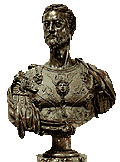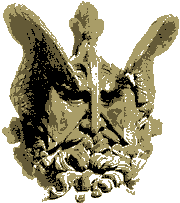Goldsmith and sculptor
Florence 1500-1571
An artist of genius who had a terrible character, which was often to lead him into trouble with the law. He wrote a treatise on sculpture and the art of goldsmithery (Florence 1568) and a picturesque autobiography (1558-66) published in Naples in 1728, which is an excellent description of the artistic climate of his times and has inspired both the theatre and the cinema.

The Perseus in the
Loggia dei Lanzi
He studied in various workshops in Florence, Siena, Pisa and Rome. It was Rome he fled to in 1519 after being involved in a brawl and he was to remain there until 1527. He then stayed in Florence and Mantova, returning to Rome to open his own goldsmith's workshop in 1529 under the protection of Pope Clement VII: he carried out works inspired by the drawings of Leonardo, Michelangelo, Raffaello and Filippino Lippi.

Cosimo
I de Medici
at the Bargello
He travelled to France (1540-45) and created several works there, all
of them dispersed today except for the bronze Nymph in the Louvre and
the famous gold and enamelled Salt and Pepper Holder (1543) today in
Vienna, where reminders of Florentine sculpture are united with the typical
refinement of the Mannerist culture of Fontainebleau.
He returned to Florence in 1545 and sculpted the bust of Cosimo
I, (Bargello), Ganymede on the Eagle (Bargello) and the famous Perseus for
the Loggia dei Lanzi in Piazza
Signoria, a work in typical Mannerist style.

